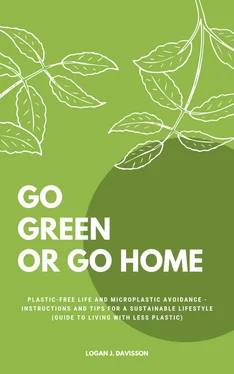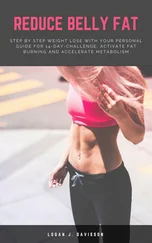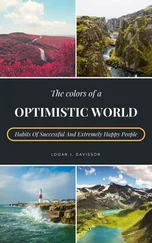Go Green Or Go Home:
Plastic-Free Life And Microplastic Avoidance - Instructions And Tips For A Sustainable Lifestyle
(Guide To Living With Less Plastic)
Reproduction, translation, further processing or similar actions for commercial purposes as well as resale or other publications are not permitted without the written consent of the author.
Copyright © 2019 - Logan J. Davisson
All rights reserved.
Introductory remarks Introductory remarks Plastic-free living - is that even possible these days? This is an important question that many people are concerned with. Plastic does not only harm our environment, but ultimately also ourselves. Accordingly, many people have been dealing with the subject of how they can reasonably live plastic-free for years. In this book you will find explanations of the dangers of plastic and a brief outline of the history of plastics. It will also show you how to start saving and replacing plastic. Ultimately, however, it is important that everyone does something about it. The easiest way, of course, is to do without plastic as much as possible. You will see that this step with the right tips and tricks is not that difficult. Yes, what is plastic anyway? Plastic is synonymous with petroleum-based plastics. These have influenced and penetrated our everyday life in the last 70 years like probably no 2nd product. The controversial discussion that has recently arisen about the "Microplastics" in our environment and floating "garbage islands" in our oceans, the topic of plastics has increasingly moved into the public focus. This book aims to provide background information on plastics, how plastic affects our daily lives, and how we can avoid plastic. The goal should be a life without plastic or at least to live largely plastic-free, in order to also leave a livable, unpolluted "blue planet" to the following generations.
What is plastic?
Why is plastic so ubiquitous?
How dangerous is plastic waste?
The Problem of Microplasty
Exfoliation
Body lotion
Hand soap
Shower gel
Hair care
Facial care
Baby products
Sunscreen
Do the laundry
Make-up
What can the individual do against plastic waste?
The Zero Waste Movement
Regional and seasonal shopping
Tips for a plastic-free life
Recipes to make yourself
Sodium bicarbonate
Citric acid
Vinegar
Curd soap
Coffee residues
Recipes to try out
Gentle all-purpose cleaner
Cleaning silver
Produce washing-up liquid
Making your own toothpaste (basic recipe as a basis)
Sodium bicarbonate against heartburn
Deacidification of the body
Biodegradable plastics
Bioplastics as an alternative to plastics
Are there any possible health risks?
How can bioplastics be disposed of in an environmentally friendly way?
Is plastic always "bad"?
Bottom line
Plastic-free living - is that even possible these days? This is an important question that many people are concerned with. Plastic does not only harm our environment, but ultimately also ourselves. Accordingly, many people have been dealing with the subject of how they can reasonably live plastic-free for years. In this book you will find explanations of the dangers of plastic and a brief outline of the history of plastics.
It will also show you how to start saving and replacing plastic. Ultimately, however, it is important that everyone does something about it. The easiest way, of course, is to do without plastic as much as possible. You will see that this step with the right tips and tricks is not that difficult. Yes, what is plastic anyway?
Plastic is synonymous with petroleum-based plastics. These have influenced and penetrated our everyday life in the last 70 years like probably no 2nd product.
The controversial discussion that has recently arisen about the
"Microplastics" in our environment and floating "garbage islands" in our oceans, the topic of plastics has increasingly moved into the public focus.
This book aims to provide background information on plastics, how plastic affects our daily lives, and how we can avoid plastic. The goal should be a life without plastic or at least to live largely plastic-free, in order to also leave a livable, unpolluted "blue planet" to the following generations.
Plastic is a colloquial term. A better term that describes this substance class is plastic. Plastic mainly stands for three different plastics. These are polyvinyl chloride (PVC), polyethylene (PE) or polyethylene terephthalate (PET). In addition, there are many other types of plastics. The question you should ask yourself accordingly is rather what plastic is at all.
Plastics are substances which are produced chemically. One also uses the term synthesized for it. They consist of so-called macromolecules. Molecules are atomic compounds and atoms are the smallest building blocks that make up everything in our universe. Complicated chemical processes are used to produce plastics. In most cases, the raw material for these processes is so-called crude oil. Most people will be familiar with petroleum. The basic structure of crude oil is changed in the series of chemical processes so that plastic can be produced. This plastic is then used in numerous areas, such as medicine or in cars. In today's world it seems that plastic and therefore plastic are indispensable. To understand this, you should take a closer look at the historical development of plastic consumption.
Over thousands of years people have made objects out of metal, stone and wood. Nobody knew plastic at that time. The first plastics, as we know them today, originated from the resin of the rubber tree. The rubber known to us today also originated from this. So you could say that rubber was the first plastic.
From a chemical point of view, celluloid was the first plastic.
Celluloid (also called cell horn) is a group of plastic compounds made from cellulose nitrate and camphor. John W. Hyatt had been looking for an inexpensive replacement material for the ivory of billiard balls and had developed a process in which heat and pressure simplified production. This material was produced from 1870 by the Celluloid Manufacturing Company under the brand name "Celluloid".
At the beginning of the 20th century, the Belgian chemist Baekeland invented a process for the production and further processing of phenolic resins. This plastic was christened Bakelite after its inventor and was the first plastic really used industrially. This marked the beginning of the era of plastics.
Once research has continued, it will not be long before plastics are established in people's lives. However, it must be remembered that plastic was only introduced into our homes almost sixty years ago in the form of household appliances. It has been proven that about one million tons of plastic were produced in the 1950s. That sounds like a huge crowd. But this is nothing compared to today's quantities of plastic. Today, it is estimated that more than 200 million tons of plastic are produced annually.
As mentioned at the beginning, the raw material for the production of plastic is petroleum. However, oil is not available indefinitely. One conclusion is therefore that in the future, with the current high consumption of plastics, it will no longer be possible to produce plastics at some point because the oil is running out.
As you can see, plastic plays a decisive role in our world. In most cases plastic is used as packaging material for food and shampoos. But why can't we imagine our lives without plastic anymore?
Why is plastic so ubiquitous?
Since the introduction of plastic in retail in 1950, it has taken on an increasingly important role in our lives. You don't even have to go to the nearest supermarket to realize how much plastic you use in your daily life. Just look around home for a few minutes. You will find that plastics play a crucial role in your life. The reasons why plastic and therefore plastic are used in production are very versatile.
Читать дальше












